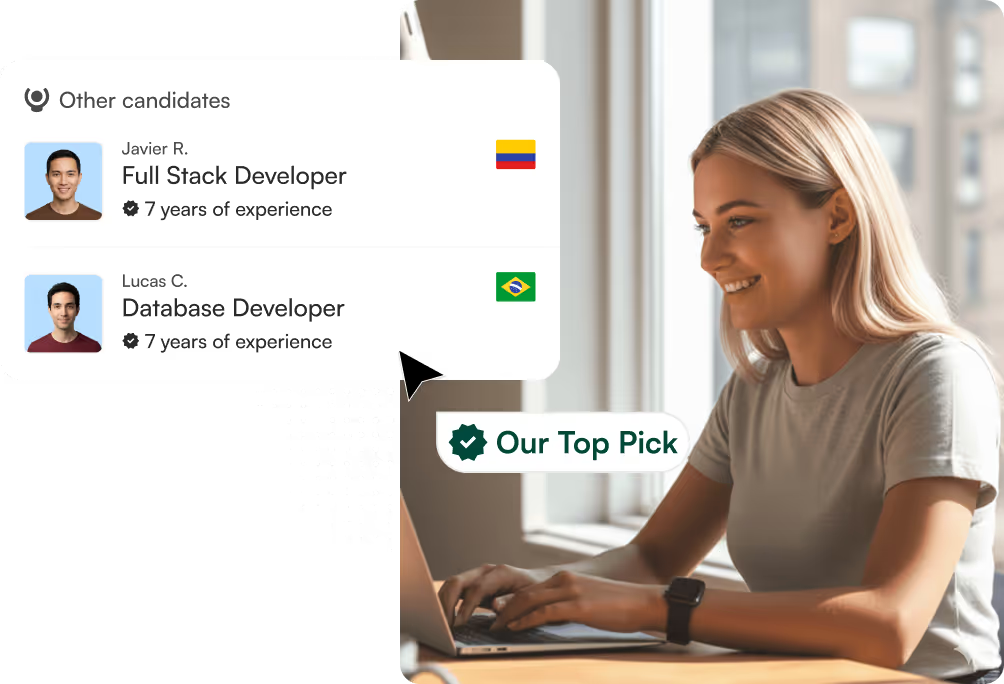How AI in Recruiting Is Redefining Talent Acquisition


Lupa will help you hire top talent in Latin America.
Book a Free Consultation
Lupa helps you build, manage, and pay your remote team. We deliver pre-vetted candidates within a week!
Book a Free ConsultationIn today's competitive job market, finding and securing top talent has become more challenging than ever. The good news? Artificial intelligence is revolutionizing recruitment processes, offering unprecedented opportunities to streamline hiring while improving outcomes. With the market for AI in recruiting growing at a remarkable CAGR of 18.9%, it's clear that this technology is rapidly becoming essential rather than optional.
What's particularly telling is that 70% of companies experimenting with AI are doing so within HR departments, with talent acquisition being the primary use case. This shift isn't just a passing trend—it represents a fundamental transformation in how organizations approach hiring.
What is AI in Recruitment?
AI in recruiting refers to the application of artificial intelligence technologies to automate, enhance, and optimize various aspects of the hiring process. Unlike traditional recruitment methods that rely heavily on manual screening and subjective decision-making, AI-powered recruitment leverages advanced algorithms, machine learning, and natural language processing to analyze vast amounts of data, identify patterns, and make predictions that help recruiters make better hiring decisions.
The distinction between artificial intelligence and machine learning in recruitment is important to understand. While AI is the broader concept of machines performing tasks that typically require human intelligence, machine learning is a subset of AI that focuses on systems that learn and improve from experience without explicit programming. In recruitment, machine learning algorithms can analyze thousands of resumes, learn what makes a successful hire, and continuously improve their selection criteria over time.
The Current State of AI Adoption in Recruitment
The adoption of AI in recruiting has accelerated dramatically in recent years. According to recent studies, 92% of firms report tangible benefits from AI implementation in their recruitment processes, with 10% reporting productivity gains exceeding 30%. Perhaps even more telling is that 93% of Fortune 500 CHROs are actively integrating AI tools into their recruitment strategies.
We're witnessing a clear trajectory toward more automated hiring processes, with a gradual shift from AI-assisted to AI-driven recruitment. This doesn't mean human recruiters are becoming obsolete—rather, their roles are evolving to focus more on relationship-building and strategic decision-making while AI handles the more repetitive, data-intensive aspects of recruitment.
Companies that have embraced AI recruiting tools are seeing significant improvements in their hiring metrics, from reduced time-to-hire to better quality of hire and increased diversity. As the technology continues to mature, we can expect even more sophisticated applications that further transform the recruitment landscape.
Key Benefits of AI in Recruitment
Time and Cost Efficiency
One of the most compelling benefits of AI in recruiting is its ability to dramatically reduce the time and costs associated with hiring. The global average time-to-hire currently stands at 44 days—a lengthy period that can result in lost productivity and missed opportunities. AI-powered automation can significantly compress this timeline by streamlining repetitive tasks throughout the recruitment process.
Take Chipotle, for example, which reduced its hiring timeline from 12 days to just 4 days after implementing AI in its recruitment workflow. Similarly, Workday's AI solutions have enabled recruiters to increase their capacity by an impressive 54%, allowing them to handle more requisitions without sacrificing quality.
By automating time-consuming tasks like resume screening, interview scheduling, and initial candidate assessments, AI frees up recruiters to focus on high-value activities such as building relationships with top candidates and making strategic hiring decisions. This not only accelerates the hiring process but also reduces the costs associated with prolonged vacancies and recruiter time.
Enhanced Candidate Experience
In today's candidate-driven market, providing an exceptional experience throughout the recruitment process is crucial. Research shows that 52% of candidates would decline offers after negative recruiting experiences, highlighting the direct impact of candidate experience on hiring outcomes.
AI in recruiting can significantly enhance the candidate experience through faster responses, personalized communication, and streamlined processes. AI-powered chatbots can provide immediate responses to candidate inquiries, offer updates on application status, and guide candidates through the recruitment process—all without delays or scheduling constraints.
Personalization is another key advantage. AI can tailor communications based on a candidate's background, interests, and stage in the recruitment process, creating a more engaging and relevant experience. This level of personalization was previously impossible at scale without significant human resources.
Reduction of Bias in Hiring
Unconscious bias remains one of the most persistent challenges in recruitment, often leading to homogeneous workforces and missed opportunities for diverse talent. When properly implemented, AI in recruiting can help reduce these biases by focusing objectively on skills, qualifications, and potential rather than demographic factors.
AI systems can be designed to ignore information that might trigger bias, such as names, ages, gender indicators, or educational institutions, focusing instead on relevant skills and experience. Some advanced AI tools can even analyze job descriptions for potentially biased language and suggest more inclusive alternatives.
However, it's important to note that AI systems themselves can perpetuate bias if they're trained on biased historical data. This is why leading organizations implement rigorous bias testing, regular audits, and diverse training data sets to ensure their AI recruitment tools promote fairness rather than reinforcing existing biases.
Access to Wider Talent Pools
Traditional recruitment methods often limit organizations to candidates who actively apply or who are within existing networks. AI in recruiting breaks down these limitations by enabling recruiters to efficiently access and screen much larger talent pools, including passive candidates who aren't actively job-seeking but might be open to the right opportunity.
AI matching algorithms can identify qualified candidates from various sources, including social media platforms, professional networks, and internal databases. These algorithms can recognize potential beyond what's explicitly stated in a resume, identifying transferable skills and predicting success based on various factors.
This expanded reach is particularly valuable when hiring for specialized roles in competitive markets. By identifying candidates who might otherwise be overlooked, AI helps organizations tap into hidden talent pools and secure the skills they need to thrive.
Popular AI Applications in the Recruitment Process
AI-Powered Job Description and Content Creation
Creating effective, inclusive job descriptions is a critical first step in attracting the right candidates. AI in recruiting is increasingly being used to optimize this process, with content creation boasting a 70% adoption rate among companies using AI in recruitment.
AI tools can analyze successful job postings, identify language that resonates with target candidates, and suggest improvements to make descriptions more appealing and inclusive. These tools can flag potentially biased language, recommend more inclusive alternatives, and ensure job requirements accurately reflect what's truly needed for success in the role.
Beyond job descriptions, AI can generate various types of recruitment content, from email templates and social media posts to candidate assessment questions. This not only saves recruiters time but also ensures consistency and quality across all recruitment communications.
Candidate Sourcing and Matching
Finding the right candidates in a vast talent landscape is like searching for needles in a haystack. AI algorithms excel at this challenge, with candidate matching showing a 54% adoption rate among organizations implementing AI in recruiting.
These algorithms can scan various sources—including job boards, social media platforms, professional networks, and internal databases—to identify potential candidates based on specified criteria. More advanced systems can even predict a candidate's likelihood of success in a role based on various factors, including skills, experience, career trajectory, and cultural fit.
The efficiency gains are substantial. What might take a human recruiter hours or days to accomplish manually can be done in minutes with AI, allowing for a much more comprehensive talent search without the corresponding increase in time investment.
Resume Screening and Candidate Assessment
The initial screening of resumes and applications is perhaps the most widely adopted application of AI in recruiting. Traditional manual screening is not only time-consuming but also prone to inconsistency and bias. AI-powered screening tools can rapidly analyze thousands of resumes, identifying candidates who best match the job requirements.
Natural language processing (NLP) enables these systems to understand the content of resumes beyond simple keyword matching. They can recognize equivalent skills described in different terms, understand the context of experience, and even assess the quality of previous roles based on company reputation and responsibilities.
Beyond resume screening, AI assessment tools can evaluate candidates' skills, personality traits, and potential job performance through various methods, including online assessments, game-based evaluations, and language analysis. These objective assessments provide additional data points for making informed hiring decisions.
AI Chatbots and Candidate Communication
Maintaining consistent, timely communication with candidates is essential for a positive recruitment experience but can be challenging to scale. AI chatbots have emerged as a powerful solution, handling initial candidate inquiries, scheduling interviews, and providing updates throughout the recruitment process.
Chipotle's 'Ava Cado' AI assistant demonstrates the impact of this technology, increasing application completion rates from 50% to an impressive 85%. By providing immediate responses to common questions and guiding candidates through the application process, chatbots ensure candidates remain engaged and informed.
These AI-powered communication tools can also personalize interactions based on a candidate's profile and stage in the recruitment process, creating a more tailored experience without requiring additional human resources. This combination of immediacy, consistency, and personalization significantly enhances the candidate experience.
AI-Powered Video Interviews
Video interviews have become increasingly common in recruitment, and AI is enhancing their value by analyzing candidate responses, facial expressions, and speech patterns to provide deeper insights. Companies like Unilever have pioneered the use of AI-powered video interviews to evaluate candidates more efficiently and objectively.
These systems can assess various factors, including communication skills, emotional intelligence, and technical knowledge, based on candidates' responses to standardized questions. Some advanced platforms can even analyze micro-expressions and vocal patterns to gauge confidence, authenticity, and stress levels.
While there are valid concerns about privacy and potential bias in such analyses, when implemented ethically and transparently, AI-powered video interviews can provide valuable additional data points for making hiring decisions, especially for roles where specific behavioral traits or communication skills are crucial.
Administrative Task Automation
The recruitment process involves numerous administrative tasks that, while necessary, consume valuable time that could be spent on more strategic activities. AI in recruiting excels at automating these tasks, with administrative task automation showing a 70% adoption rate among organizations implementing AI in their recruitment processes.
AI can automate interview scheduling by finding mutually available times, sending calendar invitations, and handling rescheduling requests. Document processing, including verification of credentials and background checks, can also be streamlined through AI, ensuring consistency and compliance while reducing manual effort.
By automating these routine tasks, AI frees recruiters to focus on high-value activities like building relationships with candidates, conducting in-depth interviews, and making strategic hiring decisions. This not only improves efficiency but also enhances job satisfaction for recruiters by reducing administrative burden.
Challenges and Ethical Considerations in AI Recruitment
Bias and Fairness Concerns
While AI in recruiting offers potential for reducing human bias, it can also perpetuate or even amplify existing biases if not carefully designed and monitored. AI systems learn from historical data, and if that data reflects past biased decisions, the AI may replicate these patterns.
Leading organizations address this challenge through "red teaming" for bias testing, where dedicated teams attempt to identify potential biases in AI systems before deployment. Regular audits of AI outputs, comparing results across different demographic groups, are also essential for ensuring fairness.
Diverse training data is crucial for mitigating bias in AI recruitment tools. By ensuring that training data includes successful candidates from various backgrounds, organizations can help their AI systems recognize talent regardless of demographic factors. Algorithmic transparency—understanding how AI makes its recommendations—is another important factor in addressing bias concerns.
Data Privacy and Security
The use of AI in recruiting involves collecting and analyzing significant amounts of candidate data, raising important privacy and security considerations. Organizations must navigate regulations such as the California Consumer Privacy Act and the EU AI Act, which impose requirements on how candidate data is collected, stored, and used.
Transparency with candidates about what data is being collected and how it will be used is not just a regulatory requirement but also an ethical imperative. Candidates should be informed when AI is being used to assess their applications and should have the option to request human review of automated decisions.
Robust data security measures are essential to protect sensitive candidate information from breaches. This includes encryption, access controls, and regular security audits. Organizations should also establish clear data retention policies, ensuring that candidate information is not kept longer than necessary.
Limitations of AI Accuracy
Despite its capabilities, AI in recruiting has limitations in understanding nuanced human qualities and may produce false positives or negatives in candidate assessment. AI excels at analyzing structured data but may struggle with contextual understanding or evaluating soft skills that are crucial for many roles.
Human oversight remains essential in the recruitment process, particularly for evaluating qualities like cultural fit, emotional intelligence, and leadership potential. AI should be viewed as a tool to enhance human decision-making rather than replace it entirely.
Organizations implementing AI in their recruitment processes should be aware of these limitations and design workflows that leverage AI's strengths while compensating for its weaknesses. This might involve using AI for initial screening but relying on human judgment for final hiring decisions, especially for roles where interpersonal skills and cultural fit are paramount.
Best Practices for Implementing AI in Recruitment
Developing a Candidate-First Mindset
Successful implementation of AI in recruiting requires a candidate-first mindset, prioritizing the candidate experience throughout the process. This means designing AI interactions that are helpful, transparent, and respectful of candidates' time and privacy.
Balancing automation with personalization is key to creating a positive candidate journey. While AI can handle routine communications and assessments, organizations should maintain human touchpoints for meaningful interactions, particularly as candidates progress through the recruitment process.
Candidates should always be informed when they're interacting with AI rather than humans, and should have clear pathways to reach human recruiters when needed. This transparency builds trust and ensures candidates feel valued rather than processed.
Maintaining Human Oversight
The most effective implementations of AI in recruiting maintain the principle of "Be human first," using AI as a tool to enhance rather than replace human expertise. Human oversight is particularly important for evaluating subjective qualities and making final hiring decisions.
Recruiters should be trained not just in how to use AI tools but also in how to interpret and sometimes override their recommendations. This requires understanding both the capabilities and limitations of the AI systems being used.
Creating clear workflows that define when AI makes decisions versus when human judgment is required helps ensure appropriate oversight. For example, AI might screen initial applications based on objective criteria, but human recruiters should review borderline cases and make final selection decisions.
Selecting the Right AI Tools
With numerous AI recruitment tools available, selecting the right solutions for your organization's specific needs is crucial. Factors to consider include integration capabilities with existing HR systems, customization options to align with your recruitment process, and vendor support for implementation and ongoing optimization.
Specific platforms like Workday Recruiting Agent, Eightfold Talent Intelligence Platform, and Fountain's AI hiring assistant offer different strengths and specializations. Organizations should evaluate these against their particular recruitment challenges and goals.
It's often beneficial to start with a focused implementation addressing a specific pain point, such as resume screening or interview scheduling, rather than attempting to transform the entire recruitment process at once. This allows for learning and adjustment before broader implementation.
Training and Upskilling Recruiters
As AI in recruiting automates routine tasks, recruiters' roles are evolving to focus more on relationship-building, strategic thinking, and complex decision-making. Organizations should invest in training recruiters for this evolving role, developing skills in areas such as candidate relationship management, data interpretation, and strategic workforce planning.
Recruiters need to understand how AI tools work, what their outputs mean, and when human judgment should override automated recommendations. This requires both technical training on specific tools and broader education on AI concepts and limitations.
Creating a culture of continuous learning is essential as AI technology rapidly evolves. Regular training updates, knowledge sharing among recruiters, and feedback loops between recruiters and AI developers can help ensure that both human and artificial intelligence continue to improve.
Monitoring Performance and Continuous Improvement
Implementing AI in recruiting is not a one-time project but an ongoing process of monitoring, evaluation, and refinement. Organizations should establish clear metrics to track the performance of their AI recruitment tools, including time-to-hire, quality of hire, diversity of candidates, and candidate satisfaction.
Regular reviews of AI outputs and decisions can identify potential issues or biases that need to be addressed. This might involve adjusting algorithms, updating training data, or modifying how AI recommendations are used in the recruitment process.
Feedback from both recruiters and candidates should be actively solicited and incorporated into continuous improvement efforts. This human perspective is invaluable for identifying areas where AI is adding value and where it may be falling short of expectations.
Ready to Transform Your Recruitment Process with AI?
Are you looking to enhance your talent acquisition strategy with AI while maintaining the human touch that makes great hires possible? Lupa offers a premium approach to recruitment that combines cutting-edge technology with deep human expertise.
As a company built in LatAm, by LatAm people, for LatAm people, Lupa understands the unique challenges of finding companies hiring remote workers and implementing effective recruitment strategies. Our approach isn't about being fast or cheap—it's about getting hiring right the first time with premium match quality and high-integrity recruiting.
Contact Lupa today to discover how our strategic, values-driven approach to recruitment can help you build the team you need to succeed in today's competitive market.
Frequently Asked Questions
How is AI being used in recruiting?
AI automates candidate screening, resume analysis, and interview scheduling while providing real-time chatbot responses. Recruiting teams use predictive analytics for candidate matching and LinkedIn sourcing. Applications include job description generation, video interview analysis, and outreach automation across industries like healthcare and high-volume scenarios.
Which AI tool is best for recruitment?
Top platforms include Workday Recruiting Agent, Eightfold Talent Intelligence Platform, Fountain (high-volume hiring), and HireVue. HR professionals should evaluate based on integration needs and specific challenges like candidate screening or open roles management.
Is AI taking over recruiting?
No. AI handles data-driven tasks while hiring managers focus on relationships and strategic decisions. Recruiting software enhances human capabilities rather than replacing them. Real-time automation improves job seekers' experiences, but human judgment remains essential for final hiring decisions.
What percentage of recruiters use AI?
- 70% of AI-experimenting companies use it in HR
- 92% report tangible recruitment benefits
- 93% of Fortune 500 CHROs actively integrate AI tools
- 10% see 30%+ productivity gains
HR professionals increasingly adopt candidate screening and administrative automation, with recruiting teams across industries implementing AI for outreach and predictive analytics.

"Over the course of 2024, we successfully hired 9 exceptional team members through Lupa, spanning mid-level to senior roles. The quality of talent has been outstanding, and we’ve been able to achieve payroll cost savings while bringing great professionals onto our team. We're very happy with the consultation and attention they've provided us."


“We needed to scale a new team quickly - with top talent. Lupa helped us build a great process, delivered great candidates quickly, and had impeccable service”


“With Lupa, we rebuilt our entire tech team in less than a month. We’re spending half as much on talent. Ten out of ten”






















